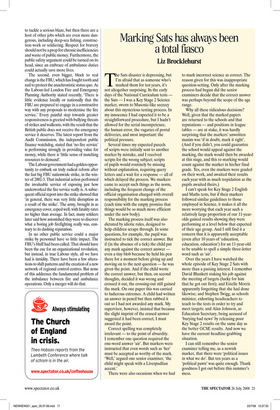Marking Sats has always been a total fiasco
Liz Brocklehurst
The Sats disaster is depressing, but I’m afraid that as someone who’s marked them for ten years, it’s not altogether surprising. In the early days of the National Curriculum tests — the Sats — I was a Key Stage 2 Science marker, sworn to Masonic-like secrecy about this mysterious testing process. In my innocence I had expected it to be a straightforward procedure, but I hadn’t allowed for the serial incompetence, the human error, the vagaries of postal deliveries, and most important: the political pressure.
Several times my expected parcels of scripts were initially sent to another marker by mistake, and I received scripts for the wrong subject; scripts of pupils would routinely be missing without explanation, requiring query letters and a wait for a response — all of which delayed the process. We markers came to accept such things as the norm, including the frequent change of the official organisation charged with overall responsibility for the marking process (each time with the empty promise that things would be so much more efficient under the new body).
The marking process itself was also dictated by idiotic rules, designed to help children scrape through. In some questions, for example, the pupil was instructed to tick the correct answer. But if (in the absence of a tick) the child put any mark against the correct answer — even a tiny blob because he held his pen there for a moment before giving up and moving on to the next question — he was given the point. And if the child wrote the correct answer, but then, on second thoughts, decided it was wrong and crossed it out, the crossing-out still gained the mark. On one paper this was carried to ludicrous extremes. A child had written an answer in pencil but then rubbed it out so I had not awarded any mark. My supervisor, however, insisted that because the slight imprint of the erased answer suggested it had been correct, I must award the point.
Correct spelling was completely irrelevant — to the point of absurdity. I remember one question required the one-word answer ‘air’. But markers were instructed that even words such as ‘her’ must be accepted as worthy of the mark. ‘Well,’ argued one senior examiner, ‘the child might speak with a Liverpudlian accent.’ There were also occasions when we had to mark incorrect science as correct. The reason given for this was inappropriate question-setting. Only after the marking process had begun did the senior examiners decide that the correct answer was perhaps beyond the scope of the age range.
Why all these ridiculous decisions? Well, given that the marked papers are returned to the schools and that reputations — and positions in league tables — are at stake, it was hardly surprising that the markers’ unwritten maxim was ‘if in doubt, mark it right’. (And if you didn’t, you could guarantee the school would appeal against the marking, the mark would then be awarded at this stage, and this re-marking would count against the marker in his/her final grade. Yes, even the markers were graded on their work, and awaited their results each year with as much trepidation as the pupils awaited theirs.) I can’t speak for Key Stage 2 English and Maths tests, but if their markers followed similar guidelines to those employed in Science, it makes it all the more worrying that each year such a relatively large proportion of our 11-yearolds gained results showing they were performing at a level below that expected of their age group. And I still find it a concern that it is apparently acceptable (even after 10 years of ‘education, education, education’) for an 11-year-old to be unable to spell a simple three-letter word such as ‘air’.
Over the years I have watched the whole episode of Key Stage 2 Sats with more than a passing interest. I remember David Blunkett staking his job against the meeting of targets (lucky for him that he got out first); and Estelle Morris apparently forgetting that she had done likewise; and Stephen Twigg, as schools minister, exhorting headteachers to teach to the tests in order to try and meet targets; and Alan Johnson, as Education Secretary, being accused of ‘burying bad news’ by releasing poor Key Stage 2 results on the same day as the better GCSE results. And now we have the current headline-grabbing situation.
I can still remember the senior examiner telling me, as a newish marker, that there were ‘political issues in what we do’. But ten years as a ‘political pawn’ was quite enough. Thank goodness I got out before this summer’s mess.


























































 Previous page
Previous page